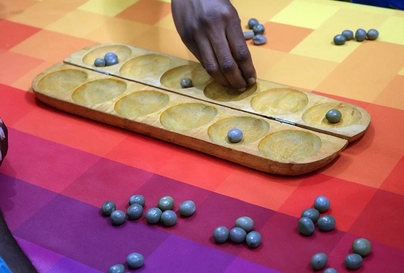
support@yorubalibrary.com
+2348073529208, 07038599574

Yoruba traditional games and sports play a significant role in the cultural heritage of the Yoruba people. These activities not only provide entertainment but also serve as a means of socialization, education, and physical fitness. This article explores some of the most popular Yoruba traditional games and sports, highlighting their cultural importance and rules.
Ayo: The Strategic Board Game
Ayo, also known as Ayo Olopon, is a traditional Yoruba board game that tests strategic thinking and mathematical skills. It is a member of the mancala family of games and is widely played across Yoruba land.
• How to Play: The game is played on a wooden board with twelve holes, arranged in two rows of six. Each hole starts with four seeds. Players take turns picking up seeds from a hole and distributing them one by one into subsequent holes. The objective is to capture as many seeds as possible by landing the last seed in an opponent’s hole containing two or three seeds.
• Cultural Significance: Ayo is often played during social gatherings and festivals. It is a game that fosters critical thinking, patience, and strategic planning.
Boju Boju: The Hide and Seek Game
Boju Boju is the Yoruba version of the classic hide and seek game, played primarily by children.
• How to Play: One player, the seeker, closes their eyes and counts while the other players hide. After counting, the seeker must find and tag the hidden players. The first person found becomes the next seeker.
• Cultural Significance: This game encourages physical activity, creativity in hiding, and quick thinking. It is a favorite pastime for children and is often played in schoolyards and during family gatherings.
Langbodo: The Outdoor Strategy Game
Langbodo is a traditional Yoruba outdoor game that involves strategy and teamwork. It is somewhat similar to the game of tag but with more complex rules.
• How to Play: Players are divided into two teams. The objective is for one team to invade the territory of the other and capture a designated object without being tagged. If tagged, the player must freeze until a teammate rescues them.
• Cultural Significance: Langbodo fosters teamwork, strategic planning, and physical fitness. It is often played during festive seasons and community gatherings.
Abula: Traditional Yoruba Ball Game
Abula is a traditional Yoruba ball game that involves hitting a ball over a net, similar to volleyball.
• How to Play: The game is played with a ball and a net, with teams on either side. The objective is to hit the ball over the net into the opponent's court, aiming to make it difficult for them to return it. Points are scored when the ball hits the ground in the opponent's court.
• Cultural Significance: Abula is a competitive and exciting sport that enhances teamwork, reflexes, and physical fitness. It is often played during sports festivals and community events.
Conclusion
Yoruba traditional games and sports are integral to the cultural identity of the Yoruba people. These activities promote physical fitness, strategic thinking, and social bonding. From the strategic board game Ayo to the physically demanding sport of Abula, these games are cherished practices that continue to bring communities together. Understanding and preserving these traditional games is essential for maintaining the cultural heritage and fostering a sense of unity among the Yoruba people.

Learn about the Yoruba concept of Ìwà Pẹ̀lẹ́ (good…

Learn special praises for Divine Being and Creator…